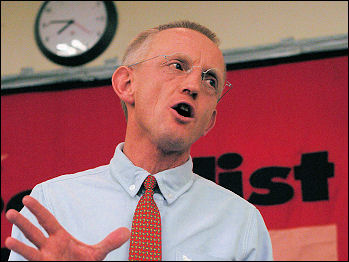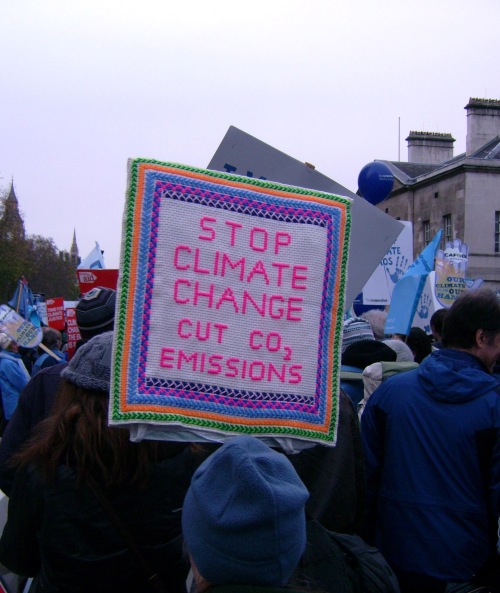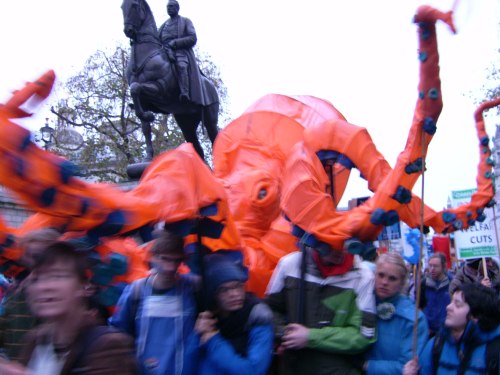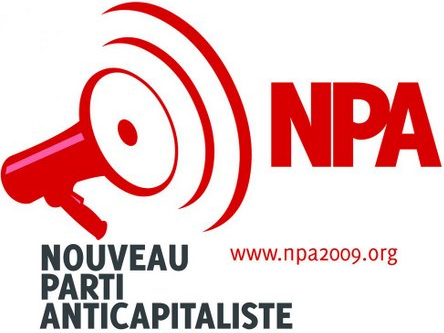The left blogosphere has been surprisingly quiet about the Pre-Budget report.
This is some how surprising considering as it is, to all intents and purposes, the Labour Manifesto for the coming election. It tells us how they intend to run the country if they are returned to power.
There has been much talk in the media of a “return to class war” (when was the Labour Party a party of class war?). Well maybe that is what the spin-doctors would like us to think. It doesn’t stand up to much scrutiny.
Class War?
The headline grabber was meant to be the 50% tax on bonuses.
But this seems to have caused little fuss in the City. The reaction was rather muted. Apart form a few rent-a-quote pundits it seems to have been ignored.
A spokesman of the Institute of Directors on Channel 4 News though just brushed it aside as a “populist side show”.
And right he was to do so. The amount it will actually raise will only be some £500m, a drop in the ocean of public finance. Compared to the billions that will be paid out, one way or another, not a big hit. It certainly can’t be described as a redistributive measure.
Even before the spokesman of the IOD spoke on Channel 4 the show had already set out a number of ways that the tax could be avoided from raising basic pay, to putting into bankers’ pension funds. And they were just a few that the journalists had thought up in their office. Considering that the City employs an army of people who’s job it is to think up financial wheezes of such complexity that even they in the end don’t understand them, it won’t take them long come up with ways of effectively neutralising this measure.
Anyway the times are good in the City, it is awash again with tax-payers’ money and consolidation caused by the crisis means there is less competition around; in fact the banks that were “too big to fail”, have grown even bigger.
Bankers are now are so immensely rich now they hardly need care about such petty baiting.
Take from the many…
So what about away from the sideshow?
For most working class working class people it means one thing. You’re going to be hit.
By the end of next year most workers (or those on more than £20,000 p.a., which happens to be the median average wage) will be hit by a 1% increase in National Insurance.
If you work in the public sector, as one in five of the workforce do, you really are going to be hit by a double whammy.
Pay increases will be kept to one percent for the next two years. This is in effect a pay cut, as inflation is likely to be, even by the Treasury’s own calculations, often over optimistic, higher.
And as we all know the headline inflation rate does not reflect people’s real experience. Every study has shown that the poorer you are, the higher inflation is for you.
Race to the bottom
This isn’t he only attack on the only attack on public sector workers.
Pension contributions are also to be capped, affecting some four million workers.
A myth has been built up that public sector workers’ are waiting to collect fat pension, and it is a myth. The average local government pension is just £4,000 pounds a year.
This myth has been propagated in order to create divisions between public and private sector workers; to create feelings of envy and bitterness.
It is based on a certain truth though. Public sector workers have an advantage of many private sector workers just by having a pension plan. Millions of others now don’t have any. Five million public sector workers are in a final salary pension, but only 800,000 workers in the private sector are.
And what does Mr Darling have to say about this?
“Public pensions need to be broadly in line with those offered in the private sector.”
Anyone who thinks that the government is making a turn back to some kind of social democracy should read that sentence again.
In the last few decades millions have seen their pensions schemes disappear or had them raided by the bosses.
Millions have no pension provision for the future, and for those that do, most are going to have to get by on a poverty pension.
Yet rather than trying to rectify this disastrous situation, Darling believes it should be imposed on even more workers. This race to the bottom and the generalizing of lowest common denominator conditions is at the heart of neo-liberalism, and Labour seems to be more tied to it than ever.
For those that are on benefits a rise next year will be to followed by a cut the year after.And that is in a benefits system that grows ever meaner and more coercive.
The deepest cut
For those that are working, with pay increases running at less than inflation (the average private sector rise was 0% this year) and with taxes and NI to set to rise, living standards are going to be cut.
Public spending also faces swinging cuts.
Alistair Darling has committed himself to halving the budget deficit in t he next four years, and 80% is to come from cuts in public expenditure.
This is as, Will Hutton writes in the Observer “the deepest and fastest proportional cut since the Second World War”
Pledges to “protect “frontline services” ring rather hollow, if for no other reason than what this means is never fully described.
The Institute of Fiscal Studies was quick to pour cold water on this promise. In fact services face average cuts of 5.6% a year. Other services face even bigger cuts, as deep as 15%. By 2013/14 all the spending increases of the Labour years will have disappeared and we will be a back at the same levels as when the Tories were last in power.
Even then the way this may play out on the ground may be worse still. In many privatised services and PFI and PPP projects the state is tied into long contracts it cannot break. Whatever cuts are made to budgets the privateers have to be paid whatever they were originally contracted for. The savings will have to be found elsewhere.
The vast new industry of private sector contractors employed by the state (and some £68bn worth of PFI contracts have already been signed, with a total £215bn pledge over the contracts lifetimes) is in the same boat as the bankers. No matter how stormy economic weather for the rest of us, they will always be seen right by the government.
More to come?
Things may turn out to be even worse than so far set out. All this is predicated on the treasury’s growth forecasts. And these have been shown to be consistently over optimistic.
If Labour wins it is highly likely that the nest government will have to come back and say “you know what, things are worse than we thought they would be”
And what will happen then? It is clear from the PBR who is expected to pay for the crisis.
The measures already announced mean a substantial cut in working class living standards and massive cuts in services.
The grandstanding about “sharing the pain” simply does not add up. The rich are facing quite modest rise in taxation. It will not effect there standard of living not one iota.
New Labour has continued the policy of allowing the rich to continue to enrich themselves, no matter the cost to the rest of us.
This is something Darling does not even dare talk about, let alone actually address.
Figures just released by the Office of National Statistics show that the richest 10% of the population own 44% of the personal assets. They are nearly five times wealthier than the bottom half of the population put together.
The bottom 10% are worth less than nothing. In total net wealth terms, they are in debt.
In terms of financial assets held (most peoples “wealth” is mostly tied up in property or pensions) the wealthiest 20% own 84% of the assets; the bottom 50% own just 1%.
Labour seems to have no intention of addressing these inequalities. In fact their proposed polices will worsen and deepen them.
Lesser Evil
It is clear what kind of “core vote” strategy this is.
It is the politics of the “lesser evil”; “the Tories will be worse”.
As that doyenne of “consciousness liberals” Polly Toynbee wrote in the Guardian:
“This was social democratic, said the government briefers as soon as Darling sat down. Yes, compared to Conservative plans to cut more furiously while gifting £11bn to the richest 2%, of course this Labour budget is better. No contest”
We will never know which of the parties will be the worst, as only one of them can from the next government. Both are planning massive attacks on working class living standards and public services.
The Tories plan to cut harder and faster we are told, but then it is likely that Labour will probably also cut harder and faster than they have so far let on.
Nor is there a real difference in the basic economic policies followed by each.
This is not like 1979 when the Tories ushered in a massive turn towards neo-liberalism, defeating a Labour Party that had no real plan for resolving the crisis.
Even less is it 1932 when Roosevelt brought in the New Deal.
If there is a comparison to be made with the US it might be 1993 when Bill Clinton came into office following the recession of the early nineties. What followed was the dismantling of much of what was left of the New Deal.
This time around we face something similar.
A working class that has already in the last thirty years had the balance of wealth and power decisively shifted against them, face another massive assault, whether by Labour or the Tories.
The proposed cuts are just the tip of the iceberg. For in their wake will come yet more neo-liberal “reform”.
Neo-liberalism is already deeply embedded in the state and the economy. Its ideology is still dominant. This is clearly seen in Darling’s pronouncements on public sector pensions and the drum beat for “efficiency savings”.
This means the fewer people doing more work for less money, an intensification of labour that has now become relentless and constant, and increased exploitation.
In pursuit of these “savings” ever more contracting out (privatisation) will take place and wages and conditions of all will have ever more downward pressure put on them.
In the private sector, as in the public, mass unemployment and the ideology of the market will be an ever-greater stick. And stick it will be; the economic crisis has much withered the carrot.
The devil and the deep blue sea
Is the “lesser evil” the best we can hope for?
The liberal commentariat seems to think so.
Some have predicted unrest in reaction to the coming austerity programme.
Yet we have had two years of crisis, growing unemployment and falling wages with little organised resistance. The union leaders (with some notable exceptions) have done nothing to fight-back and, have done nothing to “rock” Labour’s boat.
Dave Prentis, leader of Unison said of the attacks on the public sector “I am not going to sign up to this. I know how our members feel: they feel angry and betrayed. It is just not on to make nurses, social workers, dinner ladies, cleaners and hospital porters pay the price for the folly of the bankers.”
Yet what does he plan to do about? Based on his past record we can expect precious little.
If Labour wins we’ll be told that we have to put up with it, as the alternative is worse.
If they loose the cry will go up to “make sure it is a one term Tory government”, which will of course be endangered by the phantom menace of a “return to the 70s”.
Only real resistance to austerity can hope to turn the situation around. And this requires a decisive break with orthodoxies of actually existing capitalism, and its supporters in the working class, the Labour party.
And that is how we have to measure the coming general election. Meekly voting for one of types of neo-liberal assault will not save us from it.
We have to fight the likely incoming Tories and their reactionary propaganda.
But we also have to build an alternative to the more insidious influence of Labour, which will try to tie our hands who ever is in power.
Institute of Fiscal Studies on the PBR
Office of Natioanl Statisitcs Wealth and Assets survey
 It is with great sadness that we hear of the death of the French Trotskyist leader Daniel Bensaid, especially coming so soon after the death of Chris Harman, another veteran of ’68.
It is with great sadness that we hear of the death of the French Trotskyist leader Daniel Bensaid, especially coming so soon after the death of Chris Harman, another veteran of ’68.
















